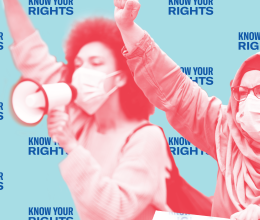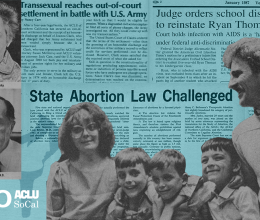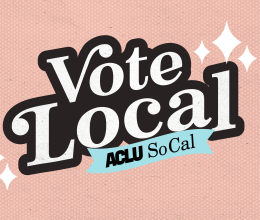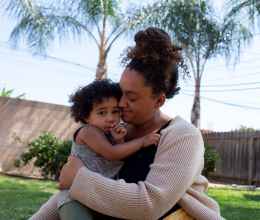
You have the right to breast/chestfeed your child in any location — public or private (except the private home or residence of another person) — where you and your child are otherwise authorized to be.
- On a park bench? Yes.
- On a train? Yes.
- In a bar that’s 21+? No. Both you AND your child must be authorized to be in the space. If your child is not allowed into the bar, then you don’t have a right to breast/chestfeed in the bar.
- In a restaurant? Yes.
- In a movie theater? Yes.
Do public accommodations — like a restaurant — need to provide me with a lactation room so that I can breast/chestfeed in private?
No. While they’re required to allow you to breast/chestfeed, they aren’t required to provide you with private accommodations.
YOUR RIGHTS ON JURY DUTY
Can I be called to serve on a jury if I’ve just had a baby?
Yes. The list of prospective jurors is compiled from registered voters on the electoral roll. If you are registered to vote, you can be called for jury duty, even if you’ve recently had a baby.
If I’m breast/chestfeeding my baby, can I be excused from jury service?
If you’re currently breast/chestfeeding your baby, you can’t be excused from jury service all together — but you can defer jury service for one year. This means that you won’t be called for jury duty for one calendar year from the date of the jury summons.
How can I request the one-year deferral?
When you’re called for jury duty, you’ll receive a document in the mail entitled “Summons for Jury Duty.” The Summons will contain a form entitled “Response Form.” Section B under “Request for Postponement” states: “I am a mother who is breast/chestfeeding a child and I request a postponement of jury service to the following date:_____.” You may request a deferral for up to one year, so check the box for Section B and write in a date that is one year (or sooner) from the date of the summons. (For example, if the summons is dated 1/1/20, you can write 1/1/21.)
What do I do if I plan to breast/chestfeed my baby for longer than one year?
In about one year, you will receive another summons. If you are still breast/chestfeeding your baby during that time, request another one-year deferral. You may defer jury service for the entire time you’re breast/chestfeeding, even if the duration spans longer than one year.
Can I pump at the courthouse?
If the courthouse is a federal courthouse, yes. All federal buildings must designate a lactation room for employees and members of the public, including jurors.
If the courthouse is a state courthouse, it is not required to provide a lactation room for jurors. The courthouse is, however, required to provide a lactation room for its employees who are lactating. If you plan to pump while serving on the jury, ask the bailiff or court clerk if you can have access to the employee lactation room to pump.
YOUR RIGHTS AT WORK
You have the right to express milk at work. Most employers in California are required to provide you with a private room and a reasonable amount of break time to pump at work.
If I want to pump at work, what type of lactation accommodations is my employer required to provide?
Your employer is required to provide you with a lactation room that is private, secure, clean, free of hazardous materials, shielded from view, and free from intrusion by supervisors, coworkers, and the public. The room must contain a place to sit, a table or shelf to place a pump and other equipment, and access to a power source to plug in an electric pump.
Can my employer set up a lactation area in the bathroom?
No. The lactation room must be a separate, private room that is not a bathroom.
Can my employer designate a multipurpose room — like a conference room — as a temporary lactation room?
Yes, but the law requires that use of the room for lactation take precedence over other uses.
I work in a building that houses many employers. Is my employer still required to provide a lactation room?
Yes. A multitenant building or multiemployer worksite must still provide lactation accommodations, but the lactation room may be shared among multiple employers.
I’m a subcontractor. Does the employer or general contractor still need to provide me with a lactation room?
Yes. You should submit a written request to the employer or general contractor stating that you are lactating and asking for lactation accommodations. Upon receipt of your request, the employer or general contractor is required to provide you with lactation accommodations within two business days.
I need to store my milk. Is my employer required to provide me with a refrigerator?
Your employer is required to provide you with a cooling device to store your milk, such as a refrigerator or an employer-provided cooler.
I need to wash my hands and my pumping equipment. Is my employer required to provide me with a sink?
Your employer must provide you with a sink that’s in close proximity to your workstation.
How many lactation breaks am I allowed to take?
Your employer is required to provide you with a reasonable amount of break time to pump. The law doesn’t specify an amount of time, but it must be sufficient time for you to walk to the designated space, wait for use of the space, set up the pumping equipment, retrieve the milk, clean the equipment afterwards, and store the milk.
Are my lactation breaks paid?
Not necessarily. While your employer must allow you break time to pump, they are not required to compensate you for that time.
However, if your employer already offers paid breaks and you use those paid breaks to pump, your time should be paid as usual. For example, if you usually receive a 15-minute paid break, and you take 20 minutes to pump, your employer must pay you for the first 15 minutes but is not required to pay you for the last 5 minutes.
How long can I pump at work?
The law allows you to take lactation breaks to express milk for an “infant child,” but doesn’t define infancy for these purposes.
Can my employer require me to submit a doctor’s note to prove I need to pump at work?
No. Your request for lactation accommodations triggers your employer’s obligation to provide you with a private lactation room and break time. You don’t need to submit any proof that you’re lactating.
What if I work in an agricultural setting?
You still have lactation rights, even if you work in an agricultural setting without traditional office space. In this circumstance, your employer must provide you with a private, enclosed, and shaded space, such as an air-conditioned cab of a truck or tractor.
Can I bring my baby to work with me so I can breast/chestfeed?
It depends. In California, you have the right to breast/chestfeed your child in any location – other than someone else’s private home – in which you and your child are authorized to be. But employers do not have a legal obligation to permit parents to bring their children to work. If your employer does not allow children in the workplace, then you do not have a right to breast/chestfeed at work.
Are there exceptions to these requirements?
Yes. If an employer has less than 50 employees and can demonstrate to the California Department of Industrial Relations that these requirements would impose an undue hardship or cause a serious disruption, then the employer will be granted an exemption to
the rule. Even with the exemption, the employer must still make reasonable efforts to provide a room or location for pumping milk that is not a toilet stall.
Can my employer harass, discriminate, or retaliate against me for taking lactation breaks?
Absolutely not. You have the right to take lactation breaks, and it is against the law for your employer to harass, discriminate, or retaliate against you for requesting or taking breaks.
What can I do if I believe my rights have been violated?
If your employer refuses to provide you with a room to pump or with lactation breaks, you can file a complaint with the California Division of Labor Standards Enforcement (DLSE), the California Department of Fair Employment and Housing (DFEH), and the US Department of Labor (DOL). If your employer harasses, discriminates, or retaliates against you, you can file a complaint with the DFEH or the US Equal Employment Opportunity Commission (EEOC). You can also contact us if you have any more questions or believe your rights have been violated.
YOUR RIGHTS AT THE AIRPORT
The federal Transportation Security Administration (TSA) has stringent liquid requirements. Can I bring my milk through security and onto the plane?
Yes, you can. The TSA only allows 3.4-ounce containers of liquid or gel that can fit inside a one-quart bag. However, expressed milk is exempt from the TSA liquid and gel regulations. You can bring as much expressed milk as your baby needs.
I need to keep my milk cool. Can I bring freezer packs on the plane?
Yes. You can bring ice packs, freezer packs, frozen gel packs, and
any other accessories you need to cool your milk. These accessories are also exempt from the TSA’s liquid and gel regulations.
Do I need to be traveling with my baby to qualify for this exemption?
No, you don’t need to be traveling with your baby. Even if you’re traveling by yourself, you can take as much expressed milk and cooling accessories as you need.
Can the TSA agent test the milk?
Yes, the TSA agent can test liquids for explosives or concealed prohibited items. The agent may ask you to transfer a small quantity of liquid to an empty container for testing. You have the right to tell the agent that you don’t want the liquid to be X-rayed or the container to be opened, in which case the agent will screen the liquid through an alternative method.
Does my pump count as a carry-on?
It might. Some airlines don’t count your pump toward your carry-on limit, and some do. Each airline treats pumps differently, so be sure to check directly with your airline before going to the airport.
Are airports required to provide a lactation room?
Yes. All airports are required to maintain a clean, private lactation room that is not a bathroom. Medium and large airports are required to have one lactation room in each terminal by January 1, 2021. Small airports must have one lactation room in each terminal by January 1, 2023.
In California, the following airports are required to have at least one lactation room as of January 1, 2021: Hollywood Burbank Airport (BUR), Los Angeles International Airport (LAX), Oakland International Airport (OAK), Ontario International Airport (ONT), John Wayne – Orange County Airport (SNA), Sacramento International Airport (SMF), San Diego International Airport (SAN), San Francisco International Airport (SFO), and Norman Y. Mineta San Jose International Airport (SJC).
How many lactation rooms do airports need to provide?
The airport must have one lactation room per terminal located after the security screening. For example, LAX has nine terminals and thus should have at least nine lactation rooms, with at least one lactation room in each terminal.
What must a lactation room in an airport contain?
The lactation room must be a clean and private space that is not a bathroom. The room must have a door that can lock, a place to sit, a flat surface, and an electrical outlet to plug in an electric pump. The room must be accessible to people with disabilities, including people who use wheelchairs.
I’m flying soon. Is there a document I can show the TSA agent if they refuse to allow me to bring milk through the security screening?
Yes. We recommend that you print out the TSA procedures on “Traveling with Children”, which explains that milk, ice packs, freezer packs, and frozen gel packs are not subject to the
liquids rule exemption: https://www.tsa.gov/travel/special-procedures/traveling-children.
YOUR RIGHTS AT MIDDLE / HIGH SCHOOL
You have the right to express milk at school. Under federal Title IX and the California Sex Equity in Education Act, lactating students must be provided with accommodations to allow them to pump at school.
I attend a public school in California. Can I pump at school?
Yes. All public schools in California must provide reasonable accommodations for lactating students on the campus.
I attend a charter school in California. Can I pump at school?
Yes. Charter schools are also required to provide reasonable accommodations for lactating students on campus.
What accommodations is my school required to provide?
Your school must provide you with access to a private, secure room that’s not a restroom to express your milk or breast/chestfeed your child. A “private area” means a place that is shielded from view and free from intrusion. The room must also contain a power source for your pump and a place to safely store expressed milk.
What if I need to pump in the middle of class?
You have the right to pump during the school day, and your school must provide you with sufficient time to pump milk. The amount of time needed varies person to person, and you should be granted leave to pump as often and for as long as you need.
Can my school penalize me for pumping during the school day?
No. The law prohibits the school from penalizing you for pumping during the school day and requires that your school provide you with the ability to make up any work you miss during your pumping breaks.
If I think my school is violating my rights, who can I talk to?
- You can contact your school’s Title IX coordinator: https://ww2.aauw.org/TitleIX
- You can file a complaint under the Uniform Complaint Procedures: https://www.aclusocal.org/en/uniform-complaint-form
- You can also contact us if you have any more questions or believe your rights have been violated.
YOUR RIGHTS ON COLLEGE AND UNIVERSITY CAMPUSES
Is my college or university required to provide me with lactation accommodations?
It depends on which school you attend. If you attend a private college or university, the law does not explicitly require your college or university to provide you with a lactation room. If you attend a school in the California Community College system or the California State University system, you are entitled to lactation accommodations.
If you attend a school in the University of California system, the law “encourages” your school to provide lactation accommodations but does not require it to do so. That said, many UC schools have adopted lactation policies for students, most of which you can find online.
If you attend a private college or university, the law does not explicitly require your college or university to provide you with a lactation room. However, the law does require the school to provide their employees with a lactation room, so you could request access to the employee lactation room.
I attend a school in the California Community College system or the California State University system. What is my school required to provide me?
The school must provide you with a private, secure room to pump milk or breast/chestfeed a baby. The room must have a comfortable place to sit, a table or shelf to place a pump and other equipment, and access to a power source to plug in an electric pump.
Can the school set up a lactation area in the bathroom?
No. The lactation room must be a separate, private room that is not a bathroom.
Is the school required to provide me with a sink?
Unfortunately, no, the school is not required to provide a sink. However, if the school renovates or expands a campus building, and the construction costs more than $5 million and involves plumbing, then the new construction must include building a sink in the lactation room.
How much time do I have to pump?
The law doesn’t specify the exact amount of break time to pump, because the amount of pumping time varies by person. The law requires the school to provide a “reasonable amount of time”, which includes the amount of time it takes to travel to the lactation room, set up the equipment, pump milk, clean the equipment, and return to class.
If I miss class time because I was pumping, can the school issue an academic penalty?
No. The law prohibits students from incurring an academic penalty as a result of using lactation accommodations.
Who can I talk to if I think my school is violating my rights?
You can contact your school’s Title IX coordinator. You can contact us if you have any more questions, are not being accommodated, and/or believe your rights have been violated.
For more information, or if you think your rights are being violated, please contact:
Breastfeed LA
info@breastfeedla.org
323.210.8505
ACLU of Southern California
ReproGender@aclusocal.org
213.977.5253






